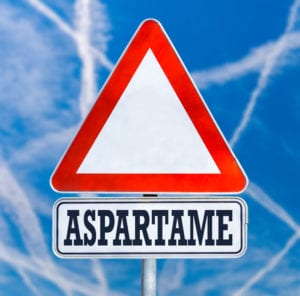Written by Joyce Smith, BS. This study found that when comparing the effect of four low-calorie sweeteners (LCSs) aspartame, saccharin, rebaudioside A and sucralose with sucrose, the LCSs had differing effects on body weight among the participating obese or overweight adults.
 While past evidence of randomized placebo controlled trials have challenged the benefits of low calorie sweeteners (LCS) on body weight, epidemiological, in vitro and animal studies escalate the concerns. The prevailing common belief is that LCSs sweeten without adding calories, yet the unique chemical structures of each LCS may influence appetite 2-4, brain reward activation 5, gut microbiota populations, and body metabolism and weight 6 differently.
While past evidence of randomized placebo controlled trials have challenged the benefits of low calorie sweeteners (LCS) on body weight, epidemiological, in vitro and animal studies escalate the concerns. The prevailing common belief is that LCSs sweeten without adding calories, yet the unique chemical structures of each LCS may influence appetite 2-4, brain reward activation 5, gut microbiota populations, and body metabolism and weight 6 differently.
The following randomized controlled trial 7 was done to determine whether chronic consumption of LCS would result in differential weight outcomes. The 12-week study compared the effects of consuming four common LCSs [aspartame, saccharin, rebaudioside A (rebA), and sucralose] and sucrose on body weight, body composition, energy intake, energy expenditure (EE), appetite, and glycemia in overweight or obese adults (obesity reflecting a BMI in kg/m2 of between 25 and 40).The authors hypothesized that the tested 4 LCSs (each LCS with its own unique physiological response) would demonstrate changes in body weight not only between them but also when compared to sucrose.
Participants (n=154) were randomized to consume daily 1.25–1.75 L of beverage sweetened with sucrose (n = 39), aspartame (n = 30), saccharin (n = 29), sucralose (n = 28), or rebaudioside A (rebA) (n = 28) for 12 weeks. Baseline anthropometric indexes, energy intake and expenditure (EE), appetite, and glucose tolerance were obtained as well as measures of body weight every two weeks, appetite assessment every 4 weeks and 24 hour urine collections to monitor compliance. A total of 123 participants completed the 12-week program.
Over the 12 weeks researchers found that participants who consumed sucrose and saccharin experienced a statistically significant increase in body weight (Δ weight = +1.85 ± 0.36 k and +1.18 ± 0.36 kg; P < 0.001 and P = 0.02) respectively. When comparing baseline measurements, there was no significant change in body weight among participants who consumed the other LCSs [changes in body weight for aspartame, rebA, and sucralose were 0.73 ± 0.35 kg, 0.60 ± 0.36 kg, and −0.78 ± 0.36 kg, respectively (P ≥ 0.07)]. However, at week 12, the change in body weight for sucralose consumers was negative and significantly lower compared with the three other LCSs (weight difference ≥ 1.37 ± 0.52 kg, P ≤ 0.008). Energy intake decreased with sucralose consumption (P=0.02) and less sucralose than saccharin was consumed (P = 0.045). Glucose tolerance was not significantly affected by any of the consumed sweeteners.
The researchers believe that if these results can be substantiated through additional testing and the mechanisms involved are validated in future studies, this trial’s results will have implications for consumers, clinicians, policy makers, and the food industry. They also reiterated that while saccharin consumption resulted in participant weight gain, sucralose had negative weight gain; thus, going forward, they recommend that all LCSs should be viewed as distinct entities when considering their potential health effects.
Source: Higgins, Kelly A., and Richard D. Mattes. “A randomized controlled trial contrasting the effects of 4 low-calorie sweeteners and sucrose on body weight in adults with overweight or obesity.” The American journal of clinical nutrition 109, no. 5 (2019): 1288-1301.
© American Society for Nutrition 2019
Posted February 2, 2021.
Joyce Smith, BS, is a degreed laboratory technologist. She received her bachelor of arts with a major in Chemistry and a minor in Biology from the University of Saskatchewan and her internship through the University of Saskatchewan College of Medicine and the Royal University Hospital in Saskatoon, Saskatchewan. She currently resides in Bloomingdale, IL.
References:
- Azad MB, Abou-Setta AM, Chauhan BF, et al. Nonnutritive sweeteners and cardiometabolic health: a systematic review and meta-analysis of randomized controlled trials and prospective cohort studies. CMAJ : Canadian Medical Association journal = journal de l’Association medicale canadienne. 2017;189(28):E929-e939.
- Smeets PA, Erkner A, de Graaf C. Cephalic phase responses and appetite. Nutr Rev. 2010;68(11):643-655.
- Swithers SE, Martin AA, Davidson TL. High-intensity sweeteners and energy balance. Physiol Behav. 2010;100(1):55-62.
- Steinert RE, Frey F, Töpfer A, Drewe J, Beglinger C. Effects of carbohydrate sugars and artificial sweeteners on appetite and the secretion of gastrointestinal satiety peptides. Br J Nutr. 2011;105(9):1320-1328.
- Smeets PA, Weijzen P, de Graaf C, Viergever MA. Consumption of caloric and non-caloric versions of a soft drink differentially affects brain activation during tasting. Neuroimage. 2011;54(2):1367-1374.
- Magnuson BA, Carakostas MC, Moore NH, Poulos SP, Renwick AG. Biological fate of low-calorie sweeteners. Nutr Rev. 2016;74(11):670-689.
- Higgins KA, Mattes RD. A randomized controlled trial contrasting the effects of 4 low-calorie sweeteners and sucrose on body weight in adults with overweight or obesity. Am J Clin Nutr. 2019;109(5):1288-1301.
